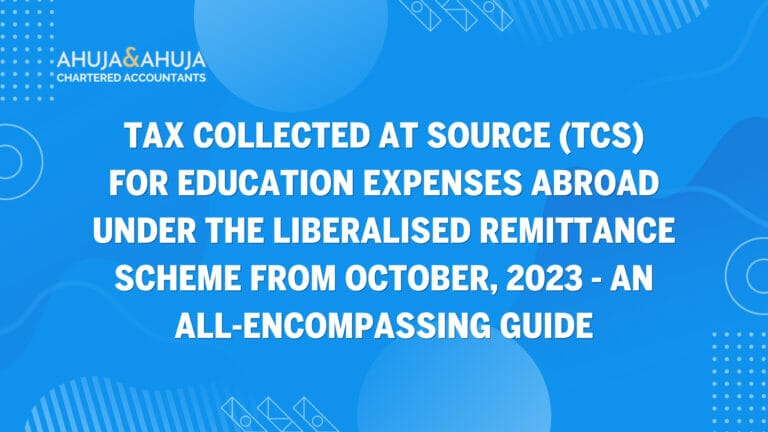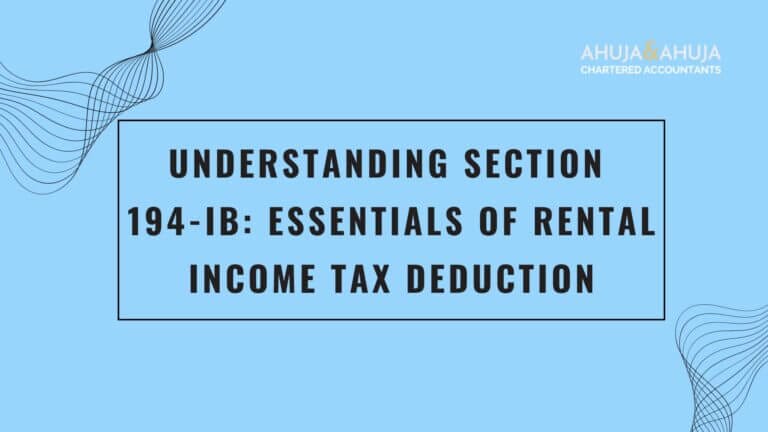TDS on Interest – Section 194A Explained
The concept of Tax Deducted at Source (TDS) plays a pivotal role in the Indian tax system.
It acts as a method to collect tax at the source of income generation, ensuring a steady flow of revenue to the government and reducing the burden of lump sum payments for taxpayers.
TDS is applicable on various types of incomes, including salaries, dividends, interest payments, and commissions.
Among these, interest payments are significant, especially in the context of Section 194A of the Income Tax Act, which specifically deals with TDS on interest income other than securities.
What is Section 194A of the Income Tax Act?
Section 194A pertains to the tax deducted at source on interest income received from sources such as fixed deposits, recurring deposits, and unsecured loans.
This section is critical as it affects a vast majority of taxpayers, including individuals, Hindu Undivided Families (HUF), and other entities engaged in generating interest income in the ordinary course of their business.
Salient Features of Section 194A:
- Applicability: This provision mandates the deduction of tax at source on interest payments made to residents of India. The nature of the interest can range from bank deposits to advances against property, highlighting the section’s broad scope.
- Exceptions: Interest income from securities, covered under Section 193, does not fall under this section. Moreover, interest payments to non-resident Indians (NRIs) are governed by Section 195 of the Act.
- Threshold for TDS Deduction: The threshold limits for TDS vary based on the type of payer and the status of the payee, emphasizing the need for awareness among taxpayers.
- Submission of Forms for Non-deduction: Individuals whose income falls below the taxable limit can furnish Form 15G or Form 15H to prevent TDS deduction on their interest income.
By requiring TDS on significant interest payments, Section 194A ensures that tax evasion practices are minimized while simultaneously simplifying the process for taxpayers to meet their annual tax liabilities.
Who deducts TDS under Section 194A of the Income Tax Act?
The responsibility of deducting TDS under Section 194A falls on various entities, primarily those handling the payouts of interest incomes.
These entities can be individuals, HUFs, companies, or other assessee types, depending on their annual turnover or gross receipts:
- Individuals and Hindu Undivided Families (HUFs): These entities must deduct TDS if their turnover or gross income from business exceeds Rs. 1 crore or from profession exceeds Rs. 50 lakhs. Those below these thresholds are excluded, easing compliance for smaller entities.
- Other Assessees: This includes corporations, partnerships, and bodies of individuals. Regardless of turnover, these entities are generally required to comply with the TDS deduction rules under this section.
This structured approach helps in systematic tax collection while also maintaining clarity on the role of various entities under tax laws.
More on TDS Filing and Rules
As we’ve introduced Section 194A and discussed who should deduct TDS under this section, in the next part of the article, we will delve into the specifics of when TDS should be deducted, the applicable rates, and the deadlines for depositing TDS.
This information will be vital for entities responsible for managing their finances or handling the finances of others, ensuring adherence to the legal framework and avoiding penalties for non-compliance.
This foundational understanding sets the stage for a deeper exploration of how to effectively manage and comply with TDS regulations under Section 194A, simplifying what can otherwise be a complex legal requirement.
When is TDS Deducted Under Section 194A?
TDS under Section 194A must be deducted at the time the interest income becomes due or is credited to the beneficiary’s account, whichever comes first.
This means tax must be deducted either upon the payment of the interest or when the interest is credited to a “Interest Payable Account,” “Suspense Account,” or any other similar account.
This preemptive deduction ensures that tax evasion is minimized and government revenues are secured in a timely manner.
What are the Rates of TDS under Section 194A?
The rates at which TDS is deducted under Section 194A vary based on certain factors, including the presence or absence of the payee’s PAN:
- With PAN: The applicable TDS rate is 10% if the interest recipient provides a valid PAN.
- Without PAN: The TDS rate escalates to 20%, increasing the tax burden due to non-compliance in furnishing PAN.
Thresholds for TDS deduction:
- Banks and financial institutions: TDS is deducted only if the interest exceeds Rs. 40,000 (Rs. 50,000 for senior citizens) in a financial year.
- Others (non-banking): For non-banking entities, TDS is required if the annual interest payment exceeds Rs. 5,000.
These conditions underscore the need for meticulous record-keeping and awareness of applicable financial thresholds to ensure proper compliance with TDS regulations.
What is the Time Limit for Depositing TDS Collected Under Section 194A?
Upon deduction, TDS must be deposited to the government as per the following deadlines:
- For TDS deducted in March: Deposit by April 30th of the same year.
- For TDS deducted from April to February: Deposit by the 7th day of the following month.
Failure to meet these deadlines can result in penalties and interest charges, making timely compliance crucial for all deductors.
Under What Conditions are the Provisions of Section 194A Not Applicable?
There are specific scenarios where TDS under Section 194A is not required:
- Interest paid to specified entities: Such as banks and institutions outlined in the Act, which are exempt due to their regulatory framework.
- Small interest payments: No TDS is required for interest payments below the stipulated thresholds (Rs. 40,000 for general and Rs. 50,000 for senior citizens).
- Intra-firm transactions: Interest credits or payments between a firm and its partners are typically exempt from TDS.
These exemptions are designed to reduce administrative burden and simplify tax obligations for certain categories of payees and small transactions.
Can I Apply for the Rate of TDS Deduction to be Lowered on Interest Incomes?
Individuals receiving interest income can apply for a lower TDS rate under Section 197 if they believe their total income will not be taxed at the higher rate normally used for TDS.
This involves submitting an application using Form 13 to the Income Tax authorities, who will assess and, if appropriate, issue a certificate authorizing a lower deduction rate.
This provision is particularly useful for taxpayers who have a mismatch between their actual tax liability and the TDS rate applied to their interest income, allowing for a more accurate reflection of their tax obligations.
Conclusion
Understanding the nuances of Section 194A of the Income Tax Act is essential for anyone dealing with considerable interest income, whether as a payer or a receiver.
Correct application of the rules relating to the deduction, timelines, rates, and exceptions can ensure compliance, optimize tax liability, and prevent legal complications.
By familiarizing oneself with the TDS deduction process, taxpayers can effectively navigate the complexities of tax regulations related to interest income.
Frequently Asked Questions (FAQs)
What is the limit for TDS on interest?
For entities like banks, the cooperative societies undertaking banking activities, or the Post Office, TDS is deducted if the interest in a financial year exceeds Rs. 40,000 for all payees and Rs. 50,000 for resident senior citizens. For other entities, the applicability threshold is Rs. 5,000.
Who is liable to deduct TDS on interest?
The duty to deduct TDS on interest rests primarily with the entity making the interest payments. This could be individuals or HUFs whose turnover exceeds the specified limit, or other entities like companies and firms irrespective of their turnover.
Is TDS applicable on saving account interest?
Interest earned on saving accounts is exempt from TDS under Section 194A. However, it’s taxable under the Income Tax Act, and if the interest exceeds Rs. 10,000 a year, it must be declared as income under “Income from other sources.”
What percentage of TDS is deducted?
Under Section 194A, the TDS rate is 10% if the payee furnishes a PAN. If not, the deduction rate is 20%.
When is TDS not required to be deducted?
TDS is not required under Section 194A when the payee is an individual or HUF whose business turnover does not exceed 1 crore or 50 lakhs in the case of professional receipts, and in other specified situations involving lower or exempt interest amounts.
Is TDS applicable on EMI of home loans?
TDS under Section 194A is applicable on the interest component of the EMI if the lender is a non-banking financial company (NBFC). For banks and other certain financial institutions, the interest on home loans is exempt from TDS.
Is TDS deducted in interest paid to partners?
TDS is not deducted on interest paid to partners in a firm on their capital accounts within the firm. This is an exemption under Section 194A, recognizing the internal nature of such transactions.
What is Section 194 and 194A?
Section 194 deals with TDS on dividends, and Section 194A deals with TDS on interest other than interest on securities. Both sections are crucial for understanding TDS implications on different types of incomes.
What is the rate of TDS under Section 194?
The rate of TDS under Section 194 for dividends is typically 10%, similar to that under Section 194A for interest income, ensuring consistency across different types of investment incomes.
Disclaimer
The materials provided herein are solely for educational and informational purposes. No attorney/professional-client relationship is created when you access or use the site or the materials. The information presented on this site does not constitute legal or professional advice and should not be relied upon for such purposes or used as a substitute for professional or legal advice.






